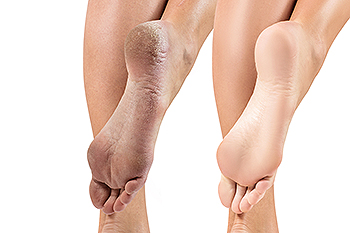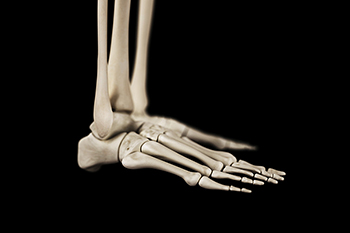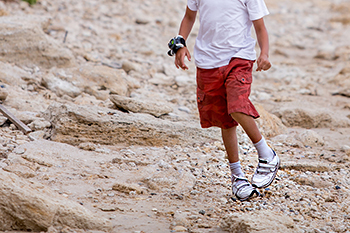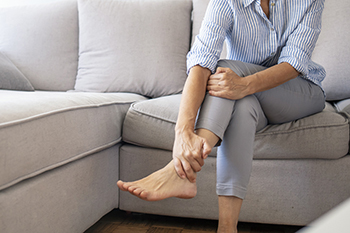Garner (919) 661-4150
December 2023
Health Implications of Cracked Heels

Cracked heels are not merely a cosmetic concern, their impact can extend beyond the surface, and may affect overall foot health and well-being. These painful fissures in the skin create an entry point for bacteria, increasing the risk of infections. As the cracks deepen, they can lead to bleeding and expose sensitive tissues, causing discomfort and hindering mobility. In severe cases, untreated cracked heels may contribute to balance issues, potentially increasing the risk of falls, particularly in older individuals. The pain associated with cracked heels can alter gait patterns, placing undue stress on other joints, such as the knees and hips. Moreover, the constant pressure on the feet can lead to chronic inflammation, exacerbating conditions such as plantar fasciitis. Addressing cracked heels involves more than cosmetic care, it is a vital aspect of maintaining overall foot health and preventing potential complications that can impact one's daily life and mobility. If you have cracked heels, it is suggested that you schedule an appointment with a podiatrist who can offer prescribed medication as an effective treatment method.
If the skin on your feet starts to crack, you may want to see a podiatrist to find treatment. If you have any concerns, contact Chukwuma Ukata, DPM from Advanced Carolina Foot and Ankle Center. Our doctor can provide the care you need to keep you pain-free and on your feet.
Cracked Heels
It is important to moisturize your cracked heels in order to prevent pain, bleeding, and infection. The reason cracked heels form is because the skin on the foot is too dry to support the immense pressure placed on them. When the foot expands, the dry skin on the foot begins to split.
Ways to Help Heal Them
- Invest in a good foot cream
- Try Using Petroleum Jelly
- Ease up on Soaps
- Drink Plenty of Water
Ways to Prevent Cracked Heels
- Moisturize After Showering
- Skip a Shower
- Keep Shower Water Lukewarm
- Don’t Scrub Your Feet
If you are unsure how to proceed in treating cracked heels, seek guidance from a podiatrist. Your doctor will help you with any questions or information you may need.
If you have any questions, please feel free to contact our office located in Garner, NC . We offer the newest diagnostic and treatment technologies for all your foot care needs.
Causes and Symptoms of Foot Stress Fractures

Foot stress fractures, prevalent among runners, are primarily attributed to overuse, constituting 80 percent of cases. The repetitive forces during running may cause microscopic bone damage, escalating into hairline fractures if adequate recovery time is not provided. Sudden increases in running volume, intensity, or frequency, common in the overtraining syndrome, can make it worse. Running form also plays a role, especially with those who have a pronounced heel strike. However, transitioning abruptly to a forefoot strike or wearing minimal footwear can similarly increase the risk of metatarsal stress fractures. Nutrition is a vital factor in preventing stress fractures of the feet. Low vitamin D levels, specifically during winter, elevate the risk of stress fractures. Runners, especially women, face heightened risk if conditions such as osteoporosis or menstrual cycle-related amenorrhea are present. Additionally, sudden changes in running surfaces, such as switching from trails to roads without proper training, can elevate the risk. Wearing proper footwear is equally as important. Old, ill-fitting shoes that lack proper support can increase bone stress. Balancing training intensity, adopting gradual changes in running techniques, maintaining a nutritious diet, and ensuring proper footwear are key components of a comprehensive approach to foot health and injury prevention. For help in managing foot stress fractures, it is suggested that you schedule an appointment with a podiatrist.
Activities where too much pressure is put on the feet can cause stress fractures. To learn more, contact Chukwuma Ukata, DPM from Advanced Carolina Foot and Ankle Center. Our doctor can provide the care you need to keep your pain free and on your feet.
Dealing with Stress Fractures of the Foot and Ankle
Stress fractures occur in the foot and ankle when muscles in these areas weaken from too much or too little use. The feet and ankles then lose support when walking or running from the impact of the ground. Since there is no protection, the bones receive the full impact of each step. Stress on the feet can cause cracks to form in the bones, thus creating stress fractures.
What Are Stress Fractures?
Stress fractures occur frequently in individuals whose daily activities cause great impact on the feet and ankles. Stress factors are most common among:
- Runners
- People affected with Osteoporosis
- Tennis or basketball players
- Gymnasts
- High impact workouts
Symptoms
Pain from the fractures occur in the area of the fractures and can be constant or intermittent. It will often cause sharp or dull pain with swelling and tenderness. Engaging in any kind of activity which involves high impact will aggravate pain.
If you have any questions please feel free to contact our office located in Garner, NC . We offer the newest diagnostic and treatment technologies for all your foot and ankle needs.
Are Bunions Affecting Your Everyday Life?
Congenital Foot Deformities and a Focus on Clubfoot

Congenital foot deformities, occurring at birth, present a spectrum of conditions that impact the structure and function of the feet. One notable congenital deformity is clubfoot, a condition where the foot is twisted inward and downward. This malformation results from a combination of genetic and environmental factors influencing the development of tendons, muscles, and bones in the foot during pregnancy. In clubfoot, the Achilles tendon is often shorter than usual, exacerbating the inward rotation of the foot. While the exact cause remains elusive, early identification and intervention are pivotal. Advances in medical understanding and technology continue to enhance treatment outcomes, providing hope for those born with congenital foot deformities. Those born with clubfoot can lead active and fulfilling lives with proper care and intervention. If your child has been born with clubfoot, it is strongly suggested that you consult a podiatrist who can immediately begin appropriate treatment.
Congenital foot problems require immediate attention to avoid future complications. If you have any concerns, contact Chukwuma Ukata, DPM of Advanced Carolina Foot and Ankle Center. Our doctor can provide the care you need to keep you pain-free and on your feet.
Congenital foot problems are deformities affecting the feet, toes, and/or ankles that children are born with. Some of these conditions have a genetic cause while others just happen. Some specific foot ailments that children may be born with include clubfeet, polydactyly/macrodactyly, and cleft foot. There are several other foot anomalies that can occur congenitally. What all of these conditions have in common is that a child may experience difficulty walking or performing everyday activities, as well as trouble finding footwear that fits their foot deformity. Some of these conditions are more serious than others. Consulting with a podiatrist as early as possible will help in properly diagnosing a child’s foot condition while getting the necessary treatment underway.
What are Causes of Congenital Foot Problem?
A congenital foot problem is one that happens to a child at birth. These conditions can be caused by a genetic predisposition, developmental or positional abnormalities during gestation, or with no known cause.
What are Symptoms of Congenital Foot Problems?
Symptoms vary by the congenital condition. Symptoms may consist of the following:
- Clubfoot, where tendons are shortened, bones are shaped differently, and the Achilles tendon is tight, causing the foot to point in and down. It is also possible for the soles of the feet to face each other.
- Polydactyly, which usually consists of a nubbin or small lump of tissue without a bone, a toe that is partially formed but has no joints, or an extra toe.
- Vertical talus, where the talus bone forms in the wrong position causing other bones in the foot to line up improperly, the front of the foot to point up, and the bottom of the foot to stiffen, with no arch, and to curve out.
- Tarsal coalition, when there is an abnormal connection of two or more bones in the foot leading to severe, rigid flatfoot.
- Cleft foot, where there are missing toes, a V-shaped cleft, and other anatomical differences.
- Macrodactyly, when the toes are abnormally large due to overgrowth of the underlying bone or soft tissue.
Treatment and Prevention
While there is nothing one can do to prevent congenital foot problems, raising awareness and receiving neonatal screenings are important. Early detection by taking your child to a podiatrist leads to the best outcome possible.
If you have any questions please feel free to contact our office located in Garner, NC . We offer the newest diagnostic tools and technology to treat your foot and ankle needs.
Mobility Challenges for People With Osteoarthritis of the Feet

Mobility can be significantly impacted in individuals with osteoarthritis of the feet. Osteoarthritis is a common joint condition characterized by the breakdown of cartilage, which cushions the joints. When it affects the feet, it can lead to several mobility-related challenges. The pain and stiffness associated with osteoarthritis can make it difficult to walk and move comfortably. Simple activities like standing up, walking short distances, or climbing stairs may become painful and challenging. The loss of joint flexibility in the feet can also affect balance, increasing the risk of falls and further hindering mobility. Osteoarthritis can alter the natural alignment of the feet, leading to abnormal walking patterns and gait disturbances. Additionally, individuals with foot osteoarthritis may become less physically active due to discomfort, which can contribute to overall deconditioning and reduced mobility. Managing osteoarthritis of the feet often involves a combination of treatments, including pain management, orthotics, assistive devices, and lifestyle modifications. When severe and more conservative treatments do not work, surgery may be needed as an intervention. If you suffer from osteoarthritis in your feet and movement is hard, it is suggested that you make an appointment with a podiatrist to discuss treatment that may help you to resume pain-free living.
Arthritis can be a difficult condition to live with. If you are seeking treatment, contact Chukwuma Ukata, DPM from Advanced Carolina Foot and Ankle Center. Our doctor can provide the care you need to keep you pain-free and on your feet.
Arthritic Foot Care
Arthritis is a joint disorder that involves the inflammation of different joints in your body, such as those in your feet. Arthritis is often caused by a degenerative joint disease and causes mild to severe pain in all affected areas. In addition to this, swelling and stiffness in the affected joints can also be a common symptom of arthritis.
In many cases, wearing ill-fitting shoes can worsen the effects and pain of arthritis. Wearing shoes that have a lower heel and extra room can help your feet feel more comfortable. In cases of rheumatoid arthritis, the arch in your foot may become problematic. Buying shoes with proper arch support that contour to your feet can help immensely.
Alleviating Arthritic Pain
- Exercises that stretch the foot can prevent further pain and injury and increase mobility
- Most of the pain can be alleviated with anti-inflammatory drugs, heat, and topical medications
- Massages can help temporarily alleviate pain.
It is best to see your doctor for the treatment that is right for your needs and symptoms. Conditions vary, and a podiatrist can help you determine the right method of care for your feet.
If you have any questions, please feel free to contact our office located in Garner, NC . We offer the newest diagnostic tools and technology to treat your foot and ankle needs.







